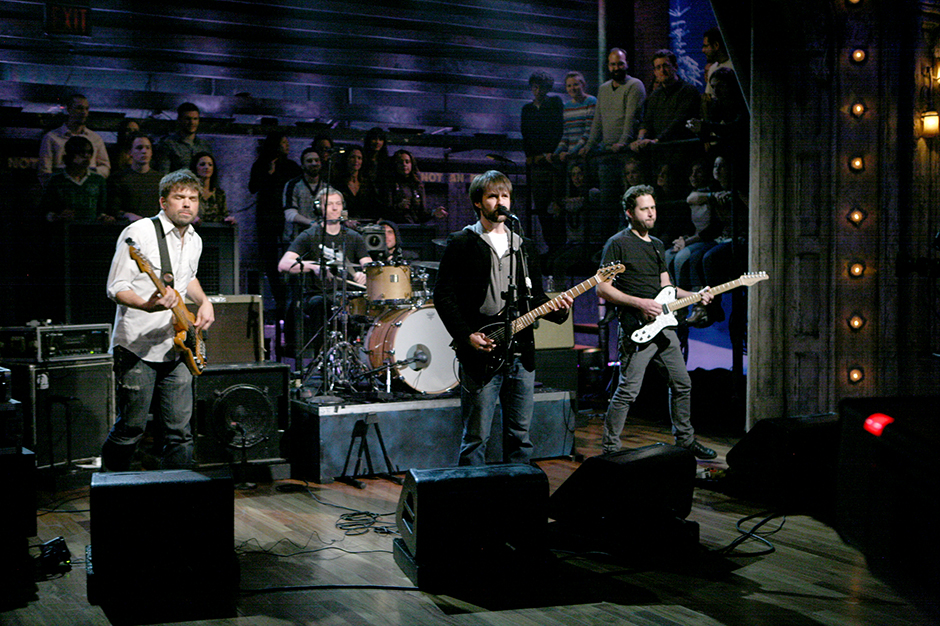Release Date: October 15, 2013
Label: Partisan
Despite the love songs, the tempered tempos, and the “You say ‘cluster’ / I say ‘fuck’!” call-and-response joke, the Dismemberment Plan’s first album in 12 years is not dad rock. Non-manchild rock, maybe. Many of us would love to live on a planet where a “dad rock” album is introduced by the lines, “You hit the spacebar enough and cocaine comes out / I really like this computer!”; but there’s only room for one They Might Be Giants in the world.
That indie rock’s most personable band has made a shirt-and-tie (but no blazer) pop album a dozen years after their mellow-yet-tense presumed finale Change might surprise no one. Long before Uncanney Valley was even a rumor, or the word “poptimism” had become a cliché, friendly-yet-combustible D-Plan frontman Travis Morrison had enthused publicly about everything from “Save the Best for Last” to “Back That Azz Up.” But the formal inversion the band pulls off here has little precedent in rock history, or even in this band — it moves even further afield from the D.C. quartet’s old work than Morrison’s polarizing solo albums.
The Dismemberment Plan once simplified complex music by sweetening unthinkable time signatures and key shifts into verse/chorus manna à la Steely Dan, but now they’ve made a deceptively simple album with complexities you could miss by blinking. “Daddy Was a Real Good Dancer” is one of the most straightforward songs that Morrison’s ever written, with almost childlike A-to-B narration (“Until he had me / And then he threw his dancing shoes away”), before the crashing awareness of the vow, “I hope I’m not a mystery to those who knew me best” dims the bright-eyed gentleness considerably. And his big five-minute love song “Lookin'” is full of fond minutiae that would make Brad Paisley proud: “Once he wanted to paint her naked / Now he only wants to paint her.” Plus, he blurts out, “I’m lucky that you love me” without signing to a major label, or even a major indie.
Few bands wear their jobs on their sleeves like the Plan. Morrison famously spent time as a developer for the Huffington; and for NASA engineer Joe Easley, being one of the world’s best drummers is only his second-most-exciting gig. Plus, if there was ever a rock star who was likely to marry a Slate editor, it’s Travis Morrison. But this transparency also could be the reason he never identifies the “White Collar White Trash” that he means to call out on a song that leaves things too open-ended. Despite the full dismissal of punk roots here — the blended-in drumming, the lack of rollercoaster twists and turns in the tempos and time signatures — Uncanney Valley‘s only real stumbles are lyrical.
Indeed, only Morrison knows what “I’m a like a fat nun on drugs / Drowning in hugs” means, or why he keeps returning to the image (other than to remind people he’s still self-consciously wacky — a legit boon in 2013). His barely upright rapping on the single “Waiting” seems all too intent on re-establishing his gleeful dorkiness. But by track three, the sample-based slow burn “Invisible,” we’re in familiar Plan territory, alone in a new city with such eloquent jitters as “biting my nails and calling it dinner.” As on Change, they save the goodies for last, with the Devo groove of “Mexico City Christmas,” arena-ready chant “Go and Get It,” and soulful four-on-the-floor jam “Let’s Just Go to the Dogs” getting us over and out.
But the key track for the new phase of these national treasures’ careers is “Living in Song,” which starts with a palm-muted, synth-dance riff taken straight from Poly Styrene’s “Toytown,” and name-checks “Basquiats” and “Koons,” presumably because, like Jay Z, Morrison is now in his forties. But the lyrics imagine a permanent touring life that these husbands and fathers ultimately turned down: “Oh man, I hope I’m not wrong / Losing everything and living in song / And I know that we didn’t try / When we were rolling side by side.” They pour one out for the nervous (if witty) post-punks they used to be, the ones who didn’t get to middle age. And then they celebrate being someone new.





